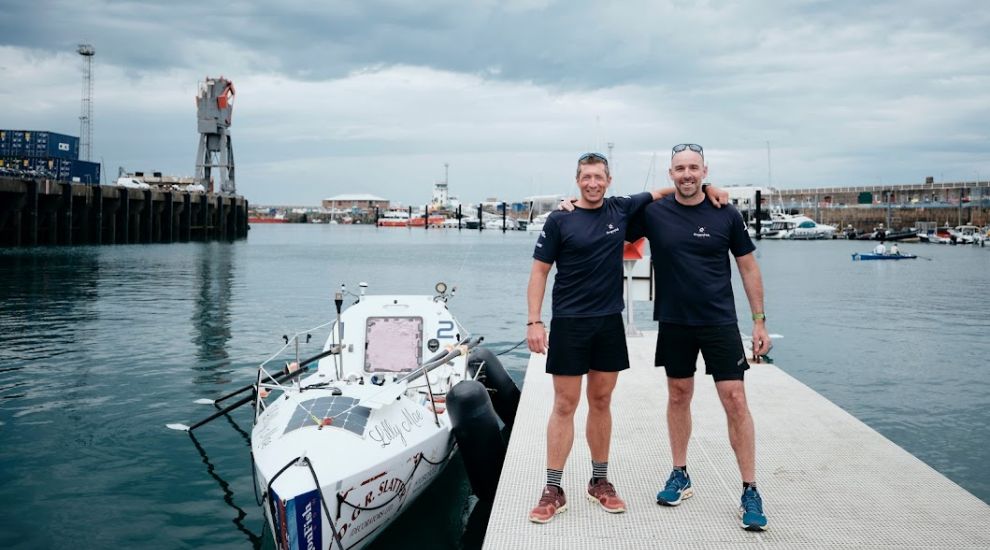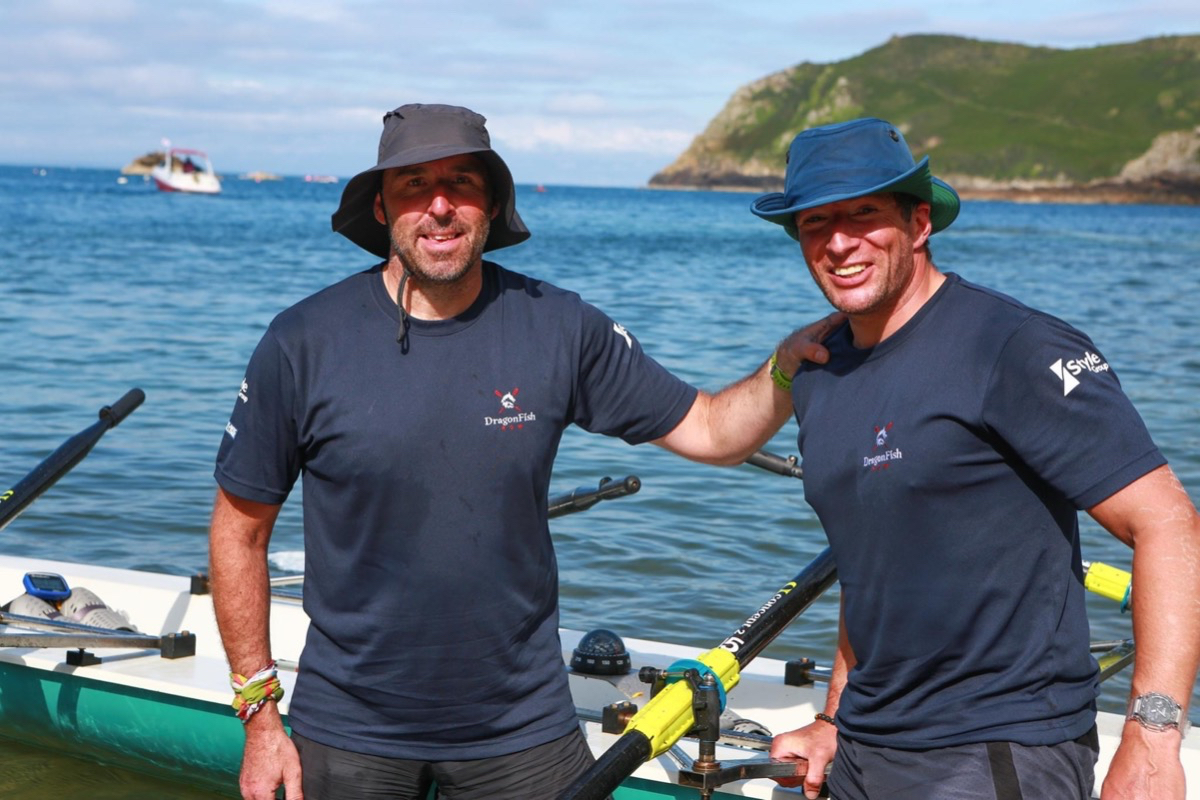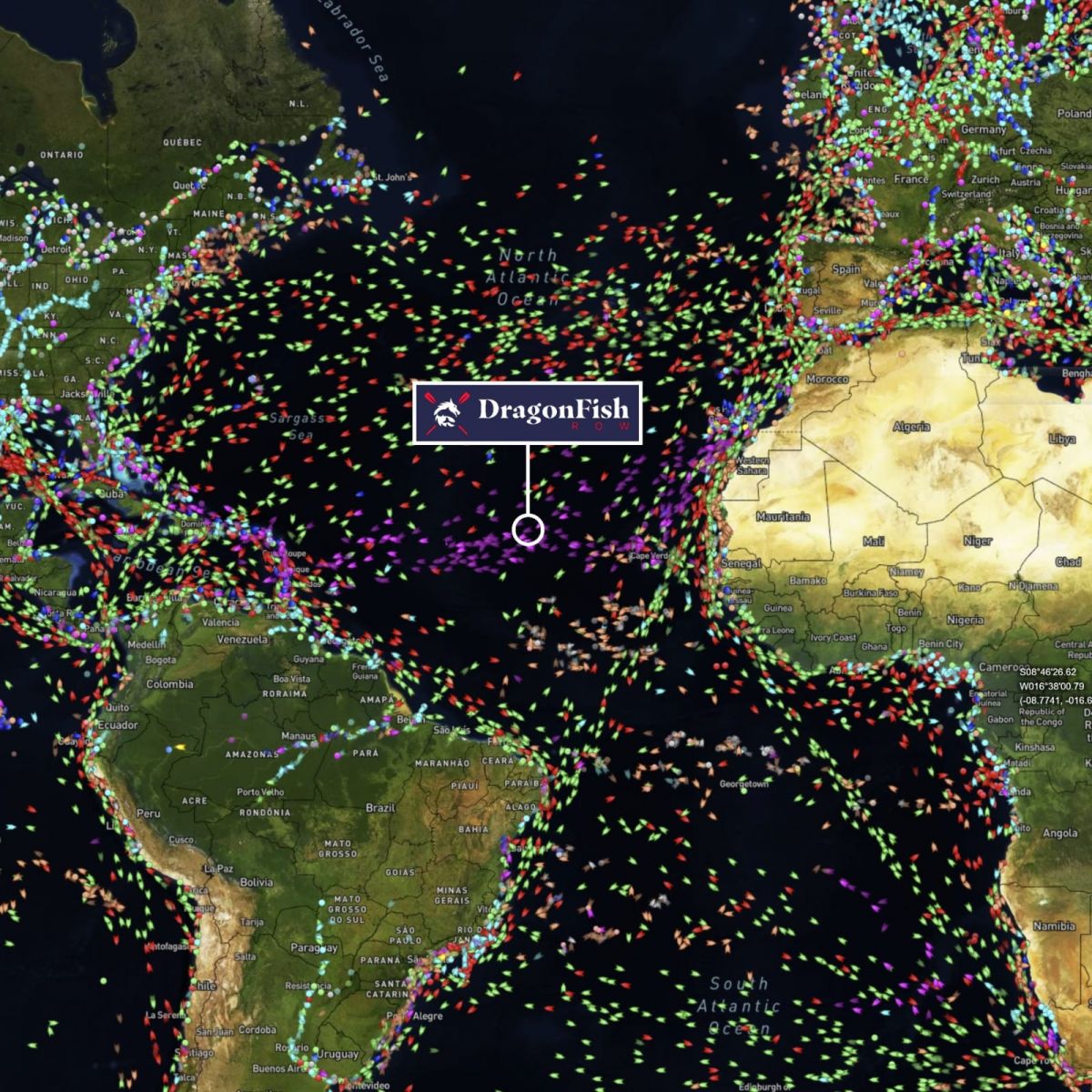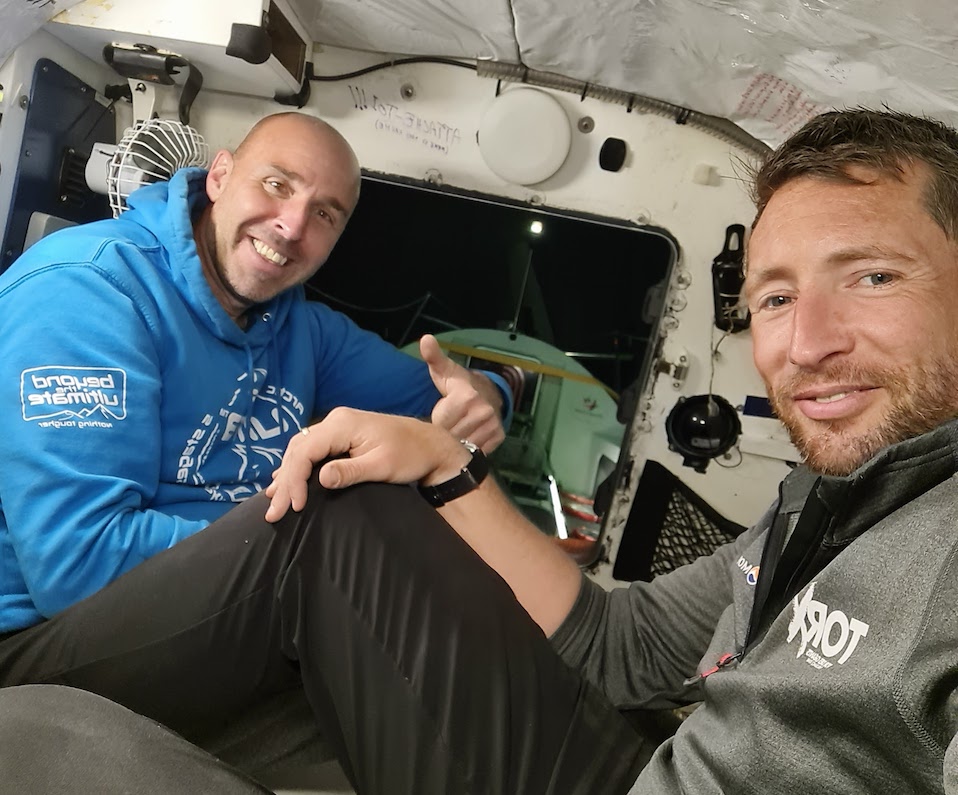


A Jersey pair attempting the "world's toughest row" across the Atlantic in aid of local charities has hit the half-way mark, but it's not all been plain sailing so far... from chafing challenges to a whale visit, and a near miss with a large tanker.
Together known as 'Team Dragonfish', Peter Wright and Steve Hayes are hoping to complete the Talisker Whiskey Challenge to raise £50,000 for Macmillan Jersey and Durrell.
After setting off from La Gomera in the Canary islands on the 12 December, they have been rowing consistently, facing 30ft waves and Atlantic storms despite having no previous rowing experience.
In the 27 days since they set off, they have covered 1,700 nautical miles. Antigua, their final destination, is another 1,300 nautical miles off.

Pictured: Peter Hayes (left) and Steve Wright (right).
The pair were ranked 28 of the 42 crews remaining in the race, but are currently ranked 1 is the open pair class. The overall leader - a four-person Spanish team called Ocean Cats - has 300 nautical miles to go.
Nearly a week into the row, the pair were visited by a whale.
"Seeing these creatures in their natural habitat can be awe-inspiring... when they do have encounters with wildlife, it really makes the day feel very special and will boost the pair for the rest of the day," an update posted on behalf of the pair on social media read.
"They have also seen shooting stars over their boat as they rowed throughout the night and have rowed over the Cape Verde Abyssal Plain, one of the deepest parts of the Atlantic Ocean at 4,900m deep."
They also celebrated both Christmas and New Year whilst bobbing around in the Atlantic Ocean.
"For these two, the day is definitely marked with Santa hats, and some bad carol singing - but in general it is business as usual - two hours on, two hours off, pushing them further towards their ultimate goal of rocking up to Antigua," an update posted on Christmas Day said.
Technical difficulties have stalked the pair throughout their journey.
An update issued on behalf of the team last week read: "With their electronics issues, the team haven't had any GPS for about a week or so, and have been navigating from their manual compass. The GPS turns on... It just doesn't seem to find any satellites."
However, the pair were particularly concerned that their AIS (Automatic Identification System) might have broken. The AIS allows ships to appear to each other from a map, and sets off an alarm if the ships are on a collision course.
Their suspicions were raised further on the weekend when the pair "looked across to see a very large tanker bearing down on them!"
"Unable to raise the bridge on their VHF, they both grabbed the fog horn and white flares ready to make as much of a warning as possible to the ship! Thankfully its direction changed a little and it passed by without issue... other than raising the heart rates of our fearless adventurers."

Pictured: DragonFish as it appears on the AIS.
Since day six, the pair have manually been making their drinking water. They brought with them a solar power desalinator, which draws water in from under the boat and forces it through a fine diaprham to filter out the salt. However, this broke down, forcing them to resort to manually pumping the water through the diaphram instead - an activity taking considerably more time and effort.
"...Manually pumped water maker takes a huge amount more time, and certainly a lot more energy to work... nobody wants to only have the manual water maker working," an update on 18 December said.

Pictured: Peter and Steve in their cabin. Recently, they spent 4 days in the cabin due to adverse weather conditions.
The weather has been fighting them too.
When the conditions make rowing impossible, Peter and Steve must retreat into their small cabin at the stern of their boat, and seal the hatches until the weather subsides. This can take days. During their last bout of poor weather, Peter and Steve were stuck in their tiny cabin for four days.
One update read: "The cabin becomes over heated at the best of times, and with two people in it, it just becomes a horrible sweat box."
Aside from the stuffy conditions, they've lost a number of chargers for their devices which were battered about during the bad weather, and the solar panels used to power the boat have not been receiving enough sunlight to keep everything running. As a result, they've lost access to the music and audiobooks they might have brought with them, forcing them to row in silence.
However, the pair are striving the find the positives.
"Often rowers are so plugged into their tech in the name of getting through a shift, that they miss things. A whale could leap out of the water behind them and without the sound of the splash, they may miss it... sound becomes a really important part of being at one with this ocean."
Perhaps unsurprisingly, the constant rowing has caused both rowers to develop sores in certain unfortunate places, making rowing just that bit more challenging.
An update on the 17 December read: "The guys have got sore bums... A combination of rocking back and forth, and the minute salt crystals from the drying ocean water cutting in to them is a recipe for these issues. Most rowers get bad bums at some stage or another."
If that wasn't bad enough, they have both been suffering from severe chafing, making rowing extremely painful.
Earlier in the race, they were even forced to drop their rowing shifts down to an hour at a time, rather than the usual two hours. They have started to suffer from the effects of sleep deprivation, including hallucinations, as the pair struggle to cram in what little sleep they can in between rowing shifts.
One update read: "If you are doing two hours on two hours off, it feels like there are six miniature days inside a real day... some opt to do three-hour shifts, mostly so that there are only four mini days in 24 hours... it some how makes the day go quicker. But with one-hour shifts... you go through 12 micro-days. 12 times a day having to wake up exhausted and drag yourself out on to the oars...
"There is no getting around it... that's a horrendous shift pattern."
Of course, the charities Peter and Steve are supporting remain a key motivator.
To sponsor the pair, you can click HERE and can track their progress live HERE.
Alternatively, islanders can take part in the 'Atlantic Accumulator" challenge' - a virtual event where people of any ability can sign up to run, walk, cycle or row as far as possible during the month of January to raise money for Durrell and Macmillian. For more information, you can click HERE.
FOCUS: ...And they’re off! 'Inexperienced' local duo tackle world’s toughest row
Rowing duo encourage islanders to race them across the Atlantic
Comments
Comments on this story express the views of the commentator only, not Bailiwick Publishing. We are unable to guarantee the accuracy of any of those comments.